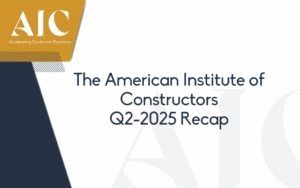The importance of ethical conduct in the construction field cannot be overstated to protect the interests of your company, project owners, workers, and other stakeholders. Amidst the complexities of project management and tight deadlines, ethical dilemmas may arise, testing the principles of construction managers.
Often, in a construction manager’s career, you will encounter an issue that puts you at the proverbial fork in the road. Do you say something? How do you bring up the issue? And who do you alert?
In such moments, whistleblowing emerges as a critical mechanism for upholding ethical standards and ensuring accountability within the industry. The American Institute of Constructors (AIC) fully supports this tactic for maintaining integrity in the industry.
Learn about the proper steps for whistleblowing in construction, which can help you take appropriate action to protect the interests of everyone involved in a project.
What is Whistleblowing in Construction?
Whistleblowing safeguards against fraudulent practices, safety violations, and other forms of misconduct that can jeopardize a project’s success and the well-being of workers and the public at large.
As the custodians of each project, a construction manager bears a profound responsibility to prioritize ethics and act as stewards of integrity – even when faced with difficult circumstances or consequences for doing the right thing.
But what should a constructor or construction manager do when whistleblowing becomes necessary? Following a few straightforward steps can help you take the appropriate action.
1. Recognize the Signs
The first step for whistleblowing is recognizing the signs of misconduct. This step entails vigilant observation of workplace practices, financial transactions, safety protocols, or any apparent misconduct by an involved party.
- Document what you observed
- Evaluate your preliminary findings against ethical standards
- Interview any involved parties to gather their insights
The key to interviewing parties is having built-in trust. Construction managers must cultivate a culture of transparency and accountability beforehand, where employees feel empowered to report wrongdoing without fear of retaliation. Without this in place, affected parties will be unwilling to share.
Once any deviation from established norms or regulations is confirmed, this should prompt further investigation.
2. Gather Evidence
After potential misconduct is identified, the next step is to gather evidence to substantiate the claims. This effort may involve collecting documents, conducting interviews, or seeking expert opinions. You want to gather as many valid facts as possible to support your position.
The key is to approach this process with diligence and objectivity, ensuring that all information is thoroughly documented and authenticated. Clear and compelling evidence strengthens the case and increases the likelihood of a successful outcome.
3. Report Your Findings
Having gathered sufficient evidence, a construction manager must decide on the appropriate course of action. Taking on the role of a whistleblower in the construction industry could involve reporting the misconduct internally to higher management or externally to regulatory authorities.
The decision should be guided by considerations of legality, company policies, and ethical obligations. While internal reporting channels may offer the advantage of resolving issues internally, external reporting may be necessary in cases where internal mechanisms fail to address the wrongdoing adequately.
4. Protect Your Employees
Regardless of the reporting mechanism chosen, confidentiality and protection of anyone who helped you along the way must be prioritized. Construction managers should ensure whistleblowers are protected from retaliation and shielded throughout the process.
Creating an environment where employees in your construction company feel comfortable speaking up is essential to continuing to foster a healthy culture. If the current situation is handled properly, employees will continue to share critical insights in the future.
5. Make Changes for the Better
In addition to reporting misconduct, construction managers have a duty to implement preventive measures to mitigate the risk of future ethical lapses. This step includes establishing robust compliance programs, conducting regular audits, and providing ethics training to employees.
By proactively addressing ethical concerns and promoting a culture of integrity, construction managers can help reduce the likelihood of future incidents that require whistleblowing.
AIC Stands on Ethical Dealings in Construction
As a leading supporter of the construction industry, AIC strongly advocates ethics within the field. Actions like whistleblowing in construction can be a valuable method of upholding ethical principles and creating a more responsible industry.
We highly encourage construction managers to take a stand for ethical standards and support employees who are willing to speak out against wrongdoing. Our organization knows this decision is difficult, especially without support.
Our members have been in your position before. They know the challenges and potential ramifications of speaking out against unethical dealings. That’s why we invite you to join AIC today and become part of a community of construction managers who can support you.
You will gain access to a network of professionals ready to share insights and help you make the right decision about whether to blow the whistle on an unethical situation. Become an AIC member to strengthen your position. Together, we can ensure that construction projects are built with integrity and accountability at their core.




